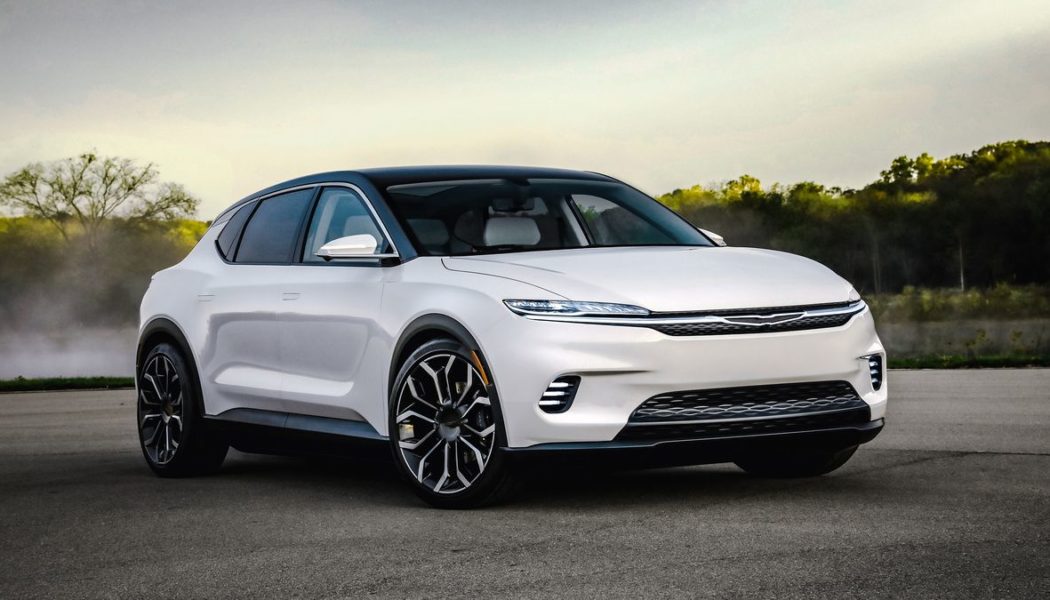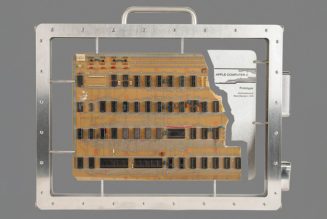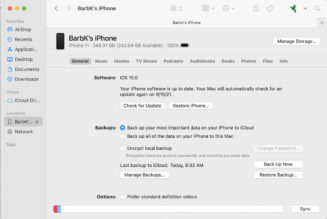Chrysler, the iconic American brand owned by Stellantis, will only sell electric vehicles by 2028, the company announced at the 2022 Consumer Electronics Show.
To emphasize this seismic shift, the company revealed its latest concept, the Airflow crossover SUV with a similar profile to the Tesla Model Y and Ford Mustang Mach-E. The vehicle unveiled at CES is meant to be just a concept, but it looks very close to production-ready. Chrysler says its first EV will start production in 2025.
Stellantis, the multi-national conglomeration that formed last year when Fiat Chrysler merged with the French PSA Group, intends for Chrysler to serve as the tip of the spear for its electrification strategy. The company, which is the fourth-largest automaker in the world, announced a comprehensive plan last year to electrify the lineups at most of its brands, including EV versions of the Dodge Ram 1500 and an electric muscle car, as well as multiple Jeep models.
The Airflow, which alludes to a historic Chrysler nameplate, is meant to serve as a preview of what’s to come. Despite its backward-looking branding, the concept car is an indication of the “future direction” for the nearly 100-year-old car company, said Chrysler CEO Christine Feuell in a statement.
:no_upscale()/cdn.vox-cdn.com/uploads/chorus_asset/file/23140004/CN021_003CH.jpg)
:no_upscale()/cdn.vox-cdn.com/uploads/chorus_asset/file/23140008/CN021_025CH.jpg)
The concept Airflow comes with all-wheel drive thanks to two 150kW motors, one in each axle. However, the drivetrain can be adjusted to accommodate more powerful motors in the future, Chrysler says. The company didn’t provide details on the battery’s size or energy capacity, but it did estimate a range of 350-400 miles per charge.
The Airflow will come equipped with Stellantis’ “STLA AutoDrive” advanced driver assist system (ADAS), which enables Level 3 autonomous driving capabilities and over-the-air software updates. (The company recently held an event to tout its new software products, including an operating system called “STLA Brain.”)
Level 3, as defined by the Society of Automotive Engineers, refers to highly automated driving where the driver still needs to be able to take over the vehicle upon request. Level 4 automation means that the car is capable of handling most driving situations itself, whereas Level 5 is largely theoretical and covers complete automation in any condition.
It’s a risky move for Chrysler to brand its driver assist system as Level 3, given the troubles other automakers have had trying to include similar systems in their production vehicles. Audi, for example, said its A8 sedan would come with a feature called Traffic Jam Pilot that, when active, would relieve human drivers of the need to pay attention during stop-and-go traffic. But the feature was contingent on approval from local authorities, and Traffic Jam Pilot remains dormant in most markets around the world.
The Airflow announces itself as an EV right away with the illuminated Chrysler Wing logo on the front grille and full-width light bars on the front and rear of the vehicle — both common features in most modern EVs. Much like the Hyundai Ioniq 5, the Airflow will have a long wheelbase and large 22-inch tires for a more low-slung riding style.
Inside, the vehicle is chock-a-block with screens: four in the front and two for rear passengers. The large central infotainment screen is flanked by smaller screens for the driver and passenger. The instrument cluster screen is set back a ways from the steering wheel, closer to the windshield than the dashboard, making it seem almost like a heads-up display. An additional screen sits below the main infotainment screen for HVAC controls and seating adjustments, among other features. And there are two screens on the seatbacks for rear passengers.
Chrysler says the user interface will be defined by “personalization,” allowing drivers to connect to their “digital lives” through the screen of their cars. It’s unclear what exactly that means, but we can assume the Airflow will come with wireless Apple CarPlay and Android Auto.
When it’s finally churning out its own EVs in 2025, Chrysler will find the market awash with electric vehicles, as most of the automaker’s competitors have moved much more rapidly to electrify their lineups. All of Stellantis’ brands have been slow to embrace EV technology compared to its major competitors. Dodge is planning to release an all-electric muscle car in 2024, while Jeep says there will be electric versions of the Wrangler, Cherokee, and Wagoneer, in addition to other models, by 2025.
We’ve gotten hints of electrification from Chrysler in the past, with little in the way of real-world results. Before it merged with PSA Group, Fiat Chrysler said it would team up with Foxconn to build EVs for Chinese consumers. The Italian-American automaker has also done some due diligence on a number of struggling EV startups in the US in an attempt to accelerate its electric ambitions, as The Verge first reported in 2019.
Now that its gone public with its plans for a full battery-electric lineup, Chrysler will face new headwinds around supply chain woes and the lack of a robust charging infrastructure. Its rivals have already outlined their plan of attack, and Chrysler will need to develop its own.








